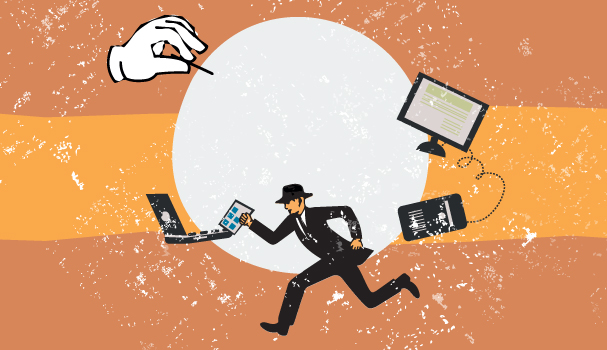The owner of the NBA’s Dallas Mavericks, Mark Cuban, knows a thing or two about tech. The American businessman and investor made his fortune in the dot-com boom of the late 1990s, founding and then selling Broadcast.com for $5bn and getting out before the bubble burst. At the turn of the century, venture capitalists were very excited about the world wide web and a whole lot of money was poured into companies that inevitably failed. Today, Cuban is worried the bubble has returned in a far more treacherous way. “If we thought it was stupid to invest in public internet websites that had no chance of succeeding back then, it’s worse today,” he said in a recent blog post on his website, warning against the current craze of investing in apps and smaller tech firms.
Cuban isn’t a lone voice as many on both sides of the pond share his concerns. Fears were only reinforced at the end of last month when the Nasdaq hit a 15-year high – up 300% since the financial crisis and the same level it was at during the dot-com mania. With things the way they are now, it may well push even higher.
Are we really in danger of a tech bubble or are Cuban and his ilk just blowing hot air? Adam Smith, founder and director of Rawnet, the digital agency, doesn’t think so; what’s more, he sees it bursting as a good thing. “In a really weird way, I want it to burst as it’s killing innovation,” he says. “Great ideas come from a natural environment, not one without financial constraints. If you’ve got all the money in the world to hire 400 developers and plunge millions into marketing, there’s room for waste and inefficiencies – which inevitably leads to crap products.”
Smith wouldn’t say that investors are being greedy but, with the hype around exceedingly high valuations, they are afraid of missing out. “Without much questioning, they’re throwing more money into these companies than they would have had they actually sat down to think about what they’re investing in and considering if they actually have a future.” In his view, there is absolutely no way to avoid the bubble popping if things continue as they are. “You can’t just chuck money at something forever if it’s not throwing money back.”
And if we look at valuations overall, they are notably well below those of the dot-com era.
Handy is a web and mobile platform that provides on-demand professional cleaning and DIY services to the UK’s major cities. It is a major player in the US, where it first launched in 2012 and last autumn it landed in the UK. Pete Dowds, the company’s UK country manager, says the current trend of huge rises in technology, and on-demand services in particular, over the past few years shows no signs of slowing down. “The market potential is huge, both in the UK and beyond. Advances in mobile technology have changed how we all go about organising our daily lives and the booking of service professionals, such as cleaners, handymen and women, has never been easier.”
Talking of the differences between today and 2000, Dowds points to WebVan, a company that wanted to deliver food based on online orders but went bankrupt in 2011. “It was just too early; there was no customer base online and they flamed.” Now, take a company like Instacart which has a huge customer base and is worth maybe $2bn. “Their worth just goes up and up and there is a lot of real weight behind it.”
Dowds agrees that there are some companies with frothy valuations, but it’s not the obvious ones. “When you boil it down and you look at most companies, including the Ubers, a lot of the valuations are justified,” he says.
As Mike Herd, chief executive of Sussex Innovation Centre, the business incubator attached to the University of Sussex, sees it, we’re not witnessing a tech bubble but a tech investment bubble. While it’s a long way off popping, he believes there is definitely too much focus on unprofitable start-ups for comfort. “What we are seeing is excessive acquisition activity and expansion on the investment side, which is often fuelled by the big companies vying with each other,” he says. “As a result there have been some high valuations in recent years, which has a major impact on how the market looks overall.” With the market currently looking so strong, the Sussex Innovation Centre is seeing a record number of people looking to set up tech businesses. “With tech having such a high profile, people have these unrealistic valuations in their mind, which is a problem.”

Mark Pearson, founder of MyVoucherCodes, recently set up a £30m fund to invest in e-commerce start-ups, so he’s obviously not a proponent of the bursting bubble argument. “I think the alarm bells are valid but only for a certain type of business,” he says, referring to companies that consumers can’t easily engage with or that can’t easily monetise. “When people hear ‘tech bubble’, they immediately think it’s going to pop and come crashing down but I wouldn’t be investing my cold, hard cash in companies if I didn’t think there was a future.”
Last year, Pearson sold Marko Media, the company that owns MyVoucherCodes and Last Second Tickets, for £55m. “It had real revenues and profits, which is where the value was found for the right buyer.” This is one of the key differences between now and the dot-com bubble: most tech companies now have a revenue stream.
“In the early days there were great markets and great products but nobody was transacting; now companies have actually found real monetisation.” Consumer confidence is also now greater and people are engaging on a previously implausible level. Adoption of a new business used to take many years and could be quite costly but now companies can very quickly scale and produce revenue. “People will actually pay for good online services now,” adds Pearson.
When Facebook floated, there were questions over how it would monetise but it has done so really well, garnering some very big revenues and profits. “The music app Shazam has a very high valuation ($1bn) and a large user base but we can’t say with any authority if it will be able to properly monetise,” says Pearson. “However, with a few good revenue streams, it could become a solid business. And the same goes for other tech companies that many are speculating about.”
The most notable difference between 2015 and 2000 is the place technology now holds in our lives. “We’re much further down the line. I’m chatting to you on my mobile phone which is literally the remote control of my life,” says Pearson. “When I’m out battery, I’m totally disconnected.” It’s this penetration that means the only way most tech companies will run into trouble is if another comes along to disrupt it but this only strengthens the case that most valuations are justified.
For Dr Gordon Fletcher, co-director of the Centre for Digital Business at the Salford Business School, there’s too much of a “cargo cult” of tech firms copying something that’s already successful in the hope of being successful. “For me, that’s always the danger with technology; the whole, ‘If they’ve been successful, then we’ll be successful,’ is fraught with risk.”
From Fletcher’s point of view, there are tech companies out there that are massively overvalued but they’re not necessarily the Ubers of this world. “It’s the ones that have dragged their feet and haven’t kept pace – the ones that aren’t able to move rapidly – that should be the most worried.”
Mark Cuban may well turn out to be right and the tech industry could be in more danger than it was when he sold Broadcast.com but the thing about bubbles is that it’s very difficult to say for sure if something will go wrong across the board. What we can say with certainty is that some companies will inevitably fail. Hype may well have a huge part to play in some valuations and while this may not be a problem from the point of view of the tech firms in question, perhaps investors should exercise a little more caution. ![]()
Share via:








































